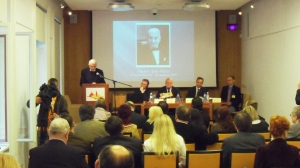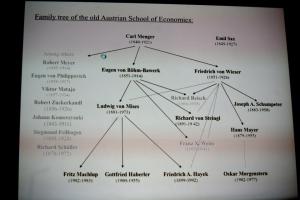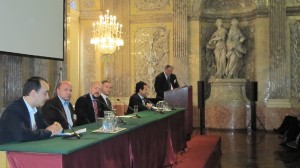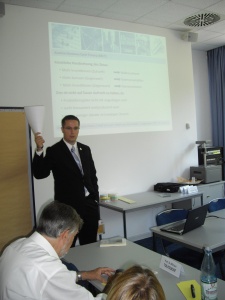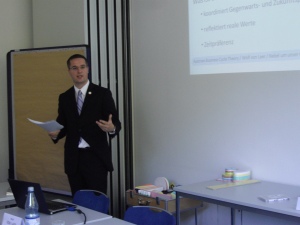Impressions from Zurich and Liechtenstein
Februar 5, 2012
Yesterday, I came back from a seminar about the future of Europe from the Hayek Society in Germany. Before that I was in Liechtenstein for the first time of my life to accept the Vernon Smith Prize. I have never been in such a small country and I liked it a lot. Folks I spoke to had a good opinion about the royal family and I learned nasty things about Austria and Germany. The latter forced the 35,000 citizen country to open up a financial market supervision unit. This being badly enough the costs of the new bureaucracy manned only with Austrians and Germans had to be paid by the government of Liechtenstein. The rent alone was over 200,000 Francs. The duke objected and was not willing to pay such a high amount. However, the next step of the Germans and Austrians was to buy the whole building, without communicating the price, and to give the whole budget at the end of the year to the state of Liechtenstein.
I think this is appalling! Disclaimer: THis information I got from a conversation with a Liechtensteiner. Did not do any additional research.
Now, some pictures from this lovely country in which all the villages have the right to seceded whenever they want.
Here you can download the articles of the three winners: http://www.ecaef.li/index.php?catID=341&navID=341&GOTO=1
ESFL’s Wolf von Laer Wins an International Vernon Smith Prize
Januar 23, 2012

We are proud to announce that European Students For Liberty’s Executive Board member, Wolf von Laer, has earned 2nd place in the European Center of Austrian Economics Foundation‘s prestigious International Vernon Smith Prize.
The Vernon Smith Prize is highly competitive. This year alone the ECAEF received papers exploring the topic, “The Rule of Law in Decline,” from 21 different countries. The three winners, decided upon by an international jury, are granted thousands of euros and invited to present their papers at a special event in Vaduz, the Principality of Liechtenstein on January 30th.
Wolf von Laer is currently working towards his Master’s degree in Austrian Economics under Dr. Jesus Huerta de Soto at Universidad Rey Juan Carlos in Madrid. He learned about the Vernon Smith Prize through the Institute for Humane Studies‘ Graduate Student Newsletter, which provides information on many great opportunities open to graduate students. Do you want to stay in the loop? Subscribe to the Graduate Student Newsletter and learn more about the great resources that the IHS provides for both undergraduates and graduate students. And remember that you can get updates about additional contests and opportunities by joining SFL’s network and following us on Facebook!
Back to the Roots: Austrian Economics Summit in Vienna
September 26, 2011
(Blog post appeared first at http://studentsforliberty.org/news/back-to-the-roots-austrian-economics-summit-in-vienna)
Last week the Austrian School of Economics returned to their roots. The Mises Supporter Summit was held in Vienna and attracted a lot of attention. 210 people from over 25 countries attended the three day Summit at the Academy of Science in the heart of Vienna.
The participants learned about the history, uprising and protagonists of the Austrian School. It is not a homogenous school and their roots go back further than the founder Carl Menger. Gabrielle Calzada, my professor in my Austrian Economics Masters degree program and president of the Juan de Mariana Institute in Madrid, lectured about the Spanish Scholastics. This group of highly educated and well-read theologians realized that they had to study Economics in order to understand the world around them and to advocate a moral system according to reality and their beliefs. They established magnificent insights about economics in the 16th and 17th centuries. Long before Adam Smith these scholars discovered theories like time preference, subjective value theory (which was lost and lead to the Water-Diamond-Paradox that classical economist could not solve) and that markets are dynamic institutions.
It was a beautiful experience to sit in the Academy of Science which was completed in 1755 and to listen to great speeches about a variety of topics, such as the life of Mises in Vienna, the rising awareness of the failing fiat money system, the upcoming free-banking debate in England and the Tragedy of the Euro (brilliant book from Philipp Bagus, a young Austrian economist who is another teacher of mine). It felt wonderful to be with so many people excited about Libertarianism and Austrian Economics, in the very same room in which Carl Menger and Eugen Böhm von Bawerk taught classes more than one century ago.
A panel of different international Mises Institutes were represented,. It was exciting to hear from the increasing interest and the achievements of Mises Institutes from Brazil, Czech Republic, Romania and Sweden. I am especially excited about an upcoming book in 2012 from the Mises Institute Sweden which is debunking the myth that interventionism and economic planning works in Sweden. Joakim Fagerström stressed this point: “Sweden: the country where everything is for free. This is of course bogus and it comes at a high price.”
We now have new groups in Austria and Spain in our network and more and more people are interested in Students for Liberty. We are working hard to extend our network. It looks good, but we still have plenty of work to do. Please support us to bring back Austrian Economics and Libertarianism to Europe
Arrival in Madrid
September 11, 2011
Since two days I am now in Madrid. Since a few hours I have a new home. Everything was quite stressful and I could not update my blog. It is still stressful but I want to give you guys a sign of life.
Last weekend I hold my first semi-professional presentation at a seminar in Gummersbach. The Friedrich-Naumann-Foundation organized an event about central-banks and I spoke about the Austrian Business Cycle Theory and the Austrian School in general. People have been quite interested and it was fun. After the seminar I caught my flight to Madrid. Yesterday Monday I was searching for a place to stay and already had my first class with Philipp Bagus (professor and author of the book „The Tragedy of the Euro„). Now I have a place and will move there tonight with my 30 kilos of stuff I have with me.
Unfortunately there is no time to relax. I have to hand in a paper about the limitations of regulation until the 15th of September for my first academic conference in Lviv Ukraine (31st September -1st October). On the 17th I am leaving Madrid for the Mises Supporter Summit in Vienna. This sounds like fun and I am excited about the different topics (http://mises.org/events/146).
The aticle was published first at the Students for Liberty Website
I think I have realized it now. I am an Executive Board Member of Students for Liberty (SFL). This student organization exists since three years and operates mainly in the U.S.A. and since this 24th-26th of June in Europe as well. The professionalism of the webinars previous to last week’s retreat (kick-off conference) at the Institute of Economic Affairs made me already excited. However, I only have realized what an incredible life changing step I made with my application for the European SFL (ESFL) board, when I stopped for a second in the meetings and realized what was going on: Nine students made their ways from all around the world (Hong Kong, Argentina, USA, Lithuania, Italy, Germany, Belgium) to London to plan the future of the classical liberal or libertarian student movement in Europe.
 Sitting in suits and talking about business plans, theory of social change, planning of conferences with 150 people (Save the date: 4th – 6th of November in Brussels), outreach, media communication and our tasks within Europe, was an incredible experience and gives me hope for the future of Europe in face of all the problems like bail-outs, transfer union, violation of civil rights, police violence, indebtedness, monetary expansion without limits and so much more. I took ownership over certain projects and I am sitting in my plane toward NYC, working on different topics and just smiling about the possibilities and interesting challenges I will encounter, about the people I am going to meet, the new things I will do and the knowledge I will gain. A first taste of this was a meeting with the Think-Tank Open Europe. The day after the three day retreat we suited up again and went with three people to the meeting. As a newbie in the organization, I took over the moderation and the introduction and explained them what we are doing, what we have done and what is going to happen in Europe. It was a fantastic experience and we found out a lot of ways to collaborate. This was incredibly fun and I am looking forward to more meetings in the US to spread the word about ESFL.
Sitting in suits and talking about business plans, theory of social change, planning of conferences with 150 people (Save the date: 4th – 6th of November in Brussels), outreach, media communication and our tasks within Europe, was an incredible experience and gives me hope for the future of Europe in face of all the problems like bail-outs, transfer union, violation of civil rights, police violence, indebtedness, monetary expansion without limits and so much more. I took ownership over certain projects and I am sitting in my plane toward NYC, working on different topics and just smiling about the possibilities and interesting challenges I will encounter, about the people I am going to meet, the new things I will do and the knowledge I will gain. A first taste of this was a meeting with the Think-Tank Open Europe. The day after the three day retreat we suited up again and went with three people to the meeting. As a newbie in the organization, I took over the moderation and the introduction and explained them what we are doing, what we have done and what is going to happen in Europe. It was a fantastic experience and we found out a lot of ways to collaborate. This was incredibly fun and I am looking forward to more meetings in the US to spread the word about ESFL.
A little bit of background knowledge for the people who do not know Students for Liberty: We are a non-profit organization from students for students dedicated to communicate the ideas of Freedom. The focus has been mainly in the U.S. so far and SFL has done a tremendous job. After only three years of existence, over 500 students groups are members of the network, one free book has been published and another one about the Morality of Capitalism (100.000 copies) is on its way. Last year SFL ran nine conferences with over 1600 participants. The biggest one included a taping of the Stossel Show and had over 500 attendees. The next year’s conference from 17th -19th February 2012 in D.C. is going to be even bigger. It is impossible for me to picture this, but it must be monumental.

 Our goal is to become THE resource for pro-liberty students all over the world. We are doing this by providing resources, like books, online seminars with famous speakers, information about possibilities for internships, conferences, and seminars. An important part of our work is to offer training to students. Every student group or student has a regional director she or he can consult. In addition to that SFL is running a Campus Coordinator Program and is providing useful handbooks how to run a student group. The last thing what we are focusing on is networking. Libertarian students are (especially in Europe) normally quite alone on the social-democratic campuses. Let me tell you: YOU ARE NOT ALONE. There are plenty of us out there and we get more every day. We are working with a lot of key figures of liberty, with think-tanks and other organization to provide the best possibilities for libertarian students. (It is self-evident that we do not work together with any kind of racist, sexist, homophobe, xenophobe, and conspiracy theorists organization.)
Our goal is to become THE resource for pro-liberty students all over the world. We are doing this by providing resources, like books, online seminars with famous speakers, information about possibilities for internships, conferences, and seminars. An important part of our work is to offer training to students. Every student group or student has a regional director she or he can consult. In addition to that SFL is running a Campus Coordinator Program and is providing useful handbooks how to run a student group. The last thing what we are focusing on is networking. Libertarian students are (especially in Europe) normally quite alone on the social-democratic campuses. Let me tell you: YOU ARE NOT ALONE. There are plenty of us out there and we get more every day. We are working with a lot of key figures of liberty, with think-tanks and other organization to provide the best possibilities for libertarian students. (It is self-evident that we do not work together with any kind of racist, sexist, homophobe, xenophobe, and conspiracy theorists organization.)
We are focusing on the ideas and encouraging discussions about different philosophies. We are not preaching that there is only one way of achieving liberty. Therefore, our definition of liberty is open, but we are stressing the importance of civil liberty to life one’s life as one wishes, of economic liberty to have the opportunity to provide for one’s life, and academic freedom. Times are changing and people are waking up. The desire for something new is not only visible in Spain or Greece. Also, a bigger and steady growing amount of brave Belarusians face the totalitarian apparatus of Lukashenko on Minsk’s streets. Unfortunately, the proposed solution often seems to be once more statism, what screwed them and us over in the first place and what was tried for far too long. It is time for our generation to communicate the ideas of freedom. It is time for the European Students for Liberty.
Dos semanas y quarto mil kilometers
Juni 29, 2011
That’s right 4.375 kilometers in two weeks. It was an intense but beautiful trip with a lot of different facets. I started of with a 14 hours bus trip to Iguazu. These are waterfalls at the border area of Brasil and Argentina. Just check out the pictures, I think they speak for themselves. Here is the link to see my itinerary: http://tinyurl.com/64xrox4
After two nice days in Iguazu I left for Asunción, the capital of Paraguay. Since I was working until the last days before leaving for my trip I was not really prepared. Traveling in countries where you do not speak the language that good should go with preparation. That was one of the lessons I have learned. It is totally doable without knowledge but its more difficult and unpreparedness can get you in messy situations. Like living as a illegal immigrant for five days in Paraguay. But to increase the excitement I want to write some lines about Asunción. The city at itself is very interesting and totally different from Argentina. Much more crowded polluted and the gap between rich and poor are direct next to each other. I have seen villas (slums) in Argentina but not two minutes away from huge governmental buildings. Ironic somehow, but very understandable in face of the fact that Paraguay has the most corrupt politicians in Latin America. I had a very good time because of the friendliness of the people, the food, the huge market districts which reminded me of Turkey and Syria and of course my couchsurfing hosts. I have stayed with two Paraguayans (Anai and Victor) and one Cyril (France). All of them were my couchsurfing hosts, but I was not the only guest. In their house stayed another French guy, a British guy, me and Gabriele from Italy. It was incredible: Everybody was hanging out with each other, went on different trips, cooking dinner together, cleaned the whole house, went out etc. This was an awesome experience and this was the reason why I stayed quite long in Asunción. This and the problem I had with my passport. It was weighing heavy on my conscious. My bus went into Ciudad del Este, which is a famous city for being smuggled goods. Unfortunately I had no time because I wanted to get as fast as possible to Asunción. Unfortunately, I was not aware of the fact that they do not stop at the Paraguayan border at Ciudad del Este. I got only an exit stamp in Argentina but not an entry stamp in Paraguay for whatever reasons. Since nobody got it I was not that concerned about it, but then I spoke to the people in Asunción and I realized the problem after some research. I was even more concerned and was pretty tense because of this. After some days with free Ballet, hippie markets (where I met German Paraguayans who were selling Currywurst), and a visit in a museum about torture during the Stroessner dictatorship I finally left with Gabriele. That was pretty good because he is able to speak Spanish fluently. I made up a plan and gave him all my pesos and Guaranis. I only hold around 100.000 which is approximately 20 Euros. I was quite sure that they will ask for money at the boarder. So it was the guy was quite happy when he noticed that I do not have an entry stamp. He asked for circa 200.000. I explained him my situation and told him that the busdriver said that I do not need a stamp, looked very sad, said a lot “disculpe” and “lo siento”. He asked my friend for additional money as well, but he told him that he does not know me and only met me on the bus. Finally I only paid the 100.000 guarani and left Paraguay and of course got all my money back from my friend. It was very exciting but I think such lessons have to be learned. After two bus trips of a total of 18 hours I arrived in Salta.
One step out of the bus and I found a very competitive hostel market there. Guys with fylers, photos and lot of information waited for me. Approximately 18 Euros for three nights with free-wifi breakfast, good service was a very good deal. They even paid my taxi to the hostel. Anyway, I was not quite sure what to do so I was just strolling around to check out some tourist offers. I could not find the company I was looking for so I called them. I just wanted to ask some questions about bungee jumping, because I was really not sure about all this. They paid my cab and I decided to do it. Ten minutes later I sat in a private car which drove me to the bridge where I was going to jump down from. For around 30 Euros it was totally worth it. Talked to the friendly lady who was driving me for two hours and practiced my Spanish. The jump itself was quite short but intense. People on the other side of the bridge where cheering and that helped me to let myself fall.
The next day I only stayed in and worked on a lot of organizational work. At the next day I climbed a mountain checked out the city and met with a French girl. We had a mutual friend from Rosario and it was a very good idea to met her, because we went to a very traditional place out of town. All the time some new guitar players and singers came in and started singing. Food was delicious and the atmosphere excellent. No tourists very authentic.
My last day in Salta started very early because I booked a tour. We drove the whole day, had a good English and Spanish speaking tour guide and we saw amazing places:
After Salta I spent two days in Cordoba and couchsurfed there. It was a very short visit but it was fun. I have been in Che Guevara museum in a little town nearby Cordoba. Was interesting but of course as you might know I am not a huge fan of him (in general not of people who are willing to kill innocent people for their believes). Then I visited for the last day Diegos family in a very small village. We had a good time visiting some farms around there and playing gold in his garden. Was very nice because I got some rest, excellent food and some nice chats with him and his wife. At the night I left for Buenos Aires to spend my last two days in Argentina in the capital. I was hanging out with Roland Sennholz the grandchild of the famous Austrian Economist. That was quite fun! After six days or so I will leave London tomorrow to fly to the New York. I will update you soon what happened here in London and what is going on in the USA. Have not had a comment in a while. Can somebody please change that?
Los ultimos dias en Rosario
Juni 23, 2011
In the moment I am sitting in my plane towards London. Finally I find some time to update my blog. I am sorry for not posting so much but in the period before my trip within Argentina and Paraguay there was a lot of work and not so many interesting things happened.
Daily routine: getting up early, going to classes, drinking mate and café to survive classes, grab some food from some kind of diner, working until the night on the translation of my book and a lot of other things (German bureaucracies, flight booking for my upcoming seminars in the US, e-mails and so on).
The weekly webinars from the Students for Liberty have been a break from the normal routine.. At 11 am in the morning we listened to lectures about a variety of topics. The participants were distributed over eight different countries and four continents. We got introduced to topics about fundraising, communication with the media, organization of conferences, leadership and many more topics. The professionalism of the Students for Liberty USA, which is reflected by the tremendous success of this organization in the US, and the quality of the other members of the European executive board is fantastic and it makes me quite excited to meet all these great individuals within the next days.
Another interesting experience was my visit at the Atucha II, which is a nuclear power plant in construction. It was not only interesting to see all these technology and to wander around part of the plant where later the fuel rods will be set in. Furthermore was this governmental project a perfect example of corruption. For every worker who was working four other were standing around him doing nothing. It was incredibly. I am quite sure that the labor unions, the governmental official who were handing out the contract and the construction company are very happy about how it went. The costs are of course paid by the taxpayers.
Some days later I invited Diego and some other friends to my farewell dinner in the same place where I had my first Asado on my first night in Argentina. It was very tasty and afterwards we have seen coincidentally a strange spectacle in form of an Uruguayan dance. Take a look at the pictures. Some kind of carnival to get rid of ghosts or something like that. Looked like fun anyway.






